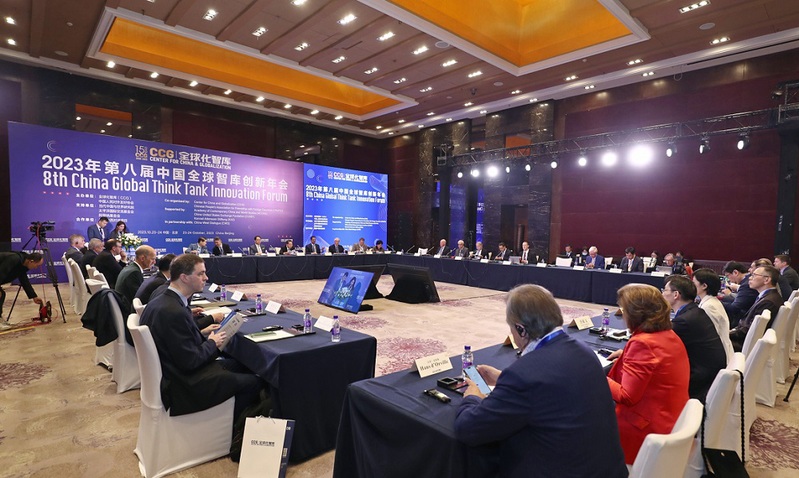Speech on the 8th China Global Think Tank Innovation Forum held by Center for China & Globalization on October 23rd, 2023
Prof. Liu Huailiang, Dean of Institute for a Community with Shared Future, Communication University of China

Dialogue between China and the United States is often accompanied by arguments. It is normal to have arguments, and arguments are not a bad thing. The Chinese often say that The truth is not clear without argument. The debate between China and the United States basically unfolds along the following three levels:
First, at the level of interests, there is dialogue and debate between development and hegemony. Seeking common interests is the main driving force for international exchanges and cooperation, and common interests are a good medicine for resolving contradictions between different countries.Common interests include economic interests, security interests, military interests, etc., but mainly common economic interests. The purpose of seeking common interests is to promote the sustainable development of the world economy, including the opening of markets and mutual development opportunities, as well as the conclusion of various bilateral and multilateral agreements. China and the United States are each other's important trading partners and were once the largest. China and the United States share many common economic interests. If this partnership is undermined, both sides will suffer huge losses. China and the United States also have different interests.China is a developing country, and so far, China's greatest interest is development. The United States is already a developed country, the richest country in the world, development is not its greatest interest, its greatest interest is to maintain hegemony, economic hegemony, military hegemony and cultural hegemony. There will certainly be conflict between the two largest economies, one for development and the other for hegemony. Dialogue is needed to reduce conflict or, at the very least, to avoid its grave consequences.
Second, at the level of responsibility, it is the different understanding of the rules. In today's world, countries are closely linked, traditional and non-traditional security factors are more prominent than ever, and global governance is facing unprecedented challenges, covering political, military, climate change, public health and other fields. In the past few decades, the international economic balance of power has undergone profound changes, and the global governance system has failed to reflect the new changes and new patterns, and is not representative and inclusive enough.The Technological Revolution and the Industrial Revolution are changing rapidly, but the rules of trade and investment are still old and closed. Global financial governance has also failed to keep pace with new forms. However, an important difference between China and the United States is the different understanding of rules. When Americans talk about rules-based international relations, they mean a set of rules. The Chinese also speak of rules, but he is referring to a different set of rules, namely an international system with the United Nations at its core and an international order based on international law.
Third, at the value level, it is a different understanding of political values and development paths.There are fundamental differences between Chinese and American political values. Americans consider themselves City on a Hill and the world should look up. The political values of the United States are universal values, and the whole world should adopt such universal values. Any government that does not conform to the democratic model is authoritarian. What Americans understand as modernization is westernization. Americans have a sense of cultural superiority and civilizational superiority. The Chinese believe that countries have different national conditions, cultures and histories. Countries have the right to choose different paths of development in light of their specific conditions. There is no distinction between superior and inferior civilizations. There should be dialogue, exchange and mutual learning among different cultures and civilizations.
The debate on these three levels will continue for a long time and will not go away any time soon, and there is no need to rush to complete agreement. But we should not therefore be totally passive and take a more pragmatic approach to effective approaches. It is a good way to seek truth from facts. Do not speak from a position of strength, treat each other as equals, respect each other, and only then can they hear each other.

